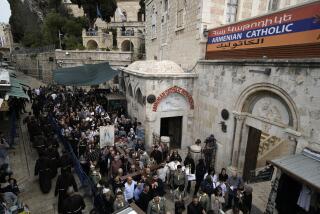Christmas With a Missionary Zeal
Christian missionaries from Southern California who find themselves scattered around the globe today are both adopting the customs of their new homes and clinging to their own traditions.
One will celebrate Christmas with a walk on the beach under the summer sun in New Zealand. Another will sleep in after a night of fireworks in Honduras. A family in Rwanda will eat a Christmas dinner of rice, beans, and--if they’re lucky--a goat. Yet another will strive to keep warm in the subzero temperatures of Moscow, telling Russians the biblical story of Christmas.
*
“On Christmas Eve and Christmas Day, we will have a live nativity scene set up at our church, Calvary Chapel Kashirskaya. Last year was our first time to try this. Because it was so unusual for Russia, it drew many people even in the minus 15 degree weather. As people come over to look at the nativity scene we share with them one on one what Christmas is all about and why God sent His son Jesus.”
--Darlene Mattox, Moscow via e-mail
*
No one keeps statistics on missionaries sent out from Southern California, though the numbers are at least in the hundreds and maybe the thousands.
Megachurches, some which have mission budgets of more than $1 million, might sponsor a dozen people annually for long-term trips. A tiny parish may scrape up enough money to partially fund a single missionary.
Glenn Kendall, an official with CBInternational, a Colorado-based ministry that has 600 Americans overseas, said it takes $35,000 annually to fund one missionary and $60,000 per couple. Experts estimate that there are more than 30,000 U.S. missionaries overseas.
*
“Our family is celebrating our 10th Christmas in Krakow, Poland. We always pray for a big snow storm on Dec. 24 so we can enjoy a beautiful white Christmas. We do have snow on the ground now, but we would love a big storm to really give us a snowed-in feeling.”
--Marla Watts, Krakow, Poland via e-mail
*
Most American missionaries celebrate Christmas by embracing the local customs while holding on to enough tradition to keep the feel of an American Christmas.
“There is not much home decorating since it is summer and daylight savings. It gets dark too late to appreciate holiday lighting!” wrote Wes Brenneman in an e-mail. A former resident of Orange, he has been a missionary for 25 years and now resides in Auckland, New Zealand. “Our family has tended to retain our Christmas traditions with an emphasis on making it a special time of the year, extensive decorating (by local standards), and a real Christmas tree.”
But outside the home, the Americans embrace the local culture.
Marla and Daniel Watts and her two children, Brittany, 12, and Caleb, 7, celebrate Wigilia, a Polish tradition, on Christmas Eve. The idea is to have a quiet family dinner the night before Christmas. The family from Costa Mesa eats special dishes such as borscht with dumplings and poppy seed cake.
Carp is the traditional main course, although “now that other fresh fish are available some people buy tastier fish,” Marla wrote. “We will have salmon again this year.”
“From our Polish friends we learned the tradition of having small, thin Christmas wafers at the table,” Marla Watts wrote. “Before the meal everyone takes their wafer and goes to each family member and shares a bite of the wafer. Then you must give blessings for the person you are sharing the wafer with. It is a very lovely and special time to share with each other.”
*
“Honduras, being primarily a Catholic country, celebrates Christmas more on Dec. 24 than on Dec. 25. Family get-togethers, firecrackers and an evening church service are all part of the celebrations. The firecrackers escalate in intensity until midnight, when the Christ child supposedly was born.”
--Duane Davis, Honduras via e-mail
*
Sometimes in such places as the volatile Middle East, world events can get in the way of tradition.
“One of the Christmas traditions here is to go to Bethlehem on Christmas Eve to be at the celebration at the Church of the Nativity, where Jesus is believed to have been born,” wrote Steve Mashni from Jerusalem.
But this year, the violence in the region led to the cancellation of the traditional celebration.
Mashni, from Irvine, said he will spend a quiet Christmas Day with friends, some of them missionaries, near Jerusalem.
“The whole population [of Israel] is in a state of mourning,” Mashni wrote.
Missionaries say Christians in other countries, often poorer and newer converts, tend to celebrate the spiritual side of Christmas and do only a modest amount of gift giving.
*
“Here in Rwanda, for Christians, Christmas celebrations are much involved with church attendance. In most churches there is a Christmas Eve service, and then there will also be a Christmas Day service. These are not usually short services (they’ll probably last three hours) and will have several choirs singing original Christmas songs, a sermon, and sometimes a play acting out the Christmas story. . . . So you see that Christmas isn’t such a family time, as we expect it to be in the U.S.”
--Doris Ferguson, Rwanda via e-mail
*
In other countries, Christmas is so novel that traditions aren’t fully formed.
Christine and Gary Colfax, missionaries from Corona, have spent the past three Christmases in Cambodia with their three children.
“The Cambodians do not have customs for Christmas, as Christianity is a new religion for them,” Christine Colfax wrote. “They are traditionally Buddhists, and this time of year has no meaning for them. What seems to be the trend for Christian Cambodians is to have a special service near Christmas, with special songs, dramas and then a meal of either curry soup or crab.”
Glenn Kendall of CBInternational spent 15 years as a missionary in Africa and called Christmases overseas a “joyful time.”
He especially remembers one Christmas Eve in the Congo, where he and his family had to walk for hours in the rain to get to their camp because the road had washed out.
Wet and cold, they huddled around an outdoor fire, trying to get warm. And then the camp radio picked up, from who knows where, an English-language broadcast of Handel’s “Messiah.”
More to Read
Sign up for Essential California
The most important California stories and recommendations in your inbox every morning.
You may occasionally receive promotional content from the Los Angeles Times.









